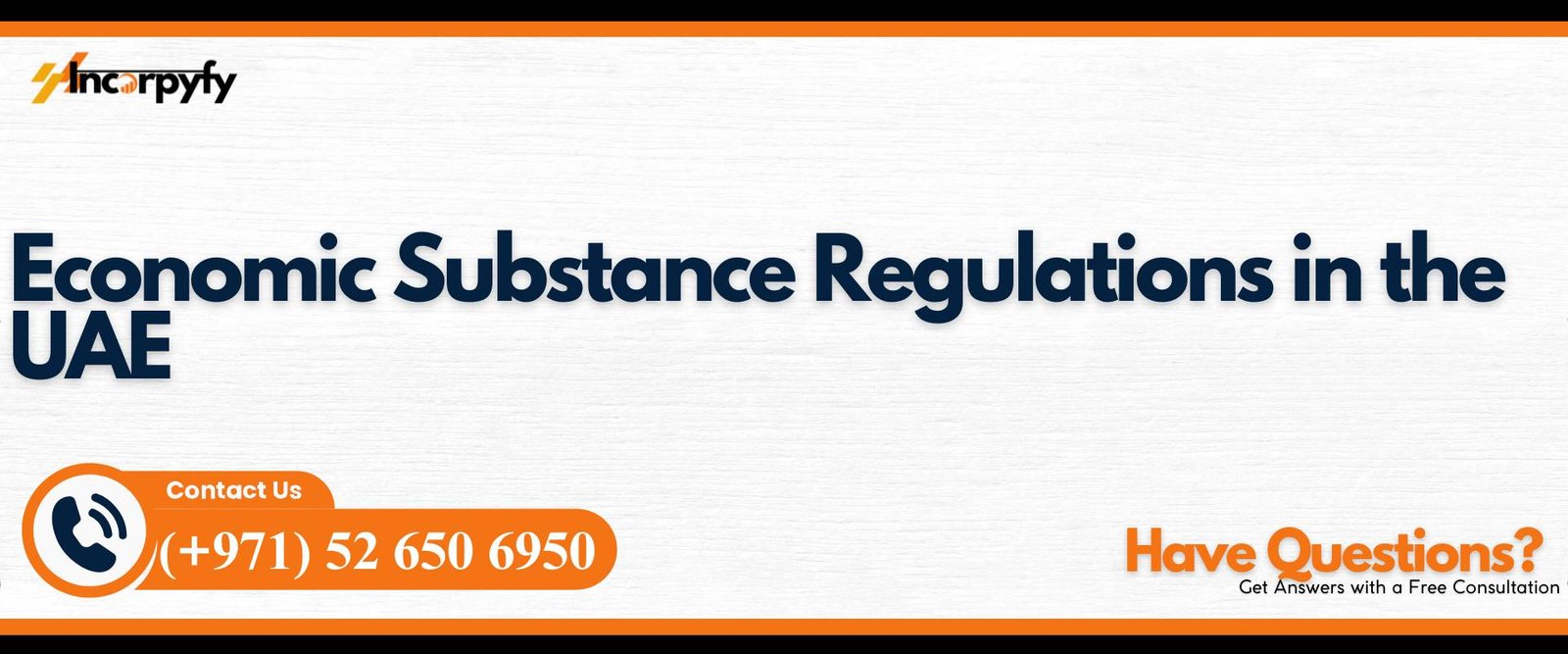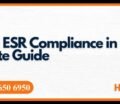
The Economic Substance Regulations (ESR) in the UAE were introduced to align the country with global tax standards and avoid harmful tax practices. These regulations have become a key compliance area for businesses operating in certain sectors. If you’re running a company in the UAE, especially in Free Zones, understanding ESR is no longer optional—it’s essential.
Understanding Economic Substance Regulations in the UAE
The UAE Economic Substance Regulations were implemented in response to the requirements set out by the Organisation for Economic Co-operation and Development (OECD) and the European Union (EU). The aim is to ensure that entities registered in the UAE conducting “Relevant Activities” have substantial activities in the UAE and are not used merely to attract profits without real economic activity.
What are Relevant Activities under ESR?
Businesses in the UAE that carry out any of the following Relevant Activities must comply with ESR:
- Banking
- Insurance
- Investment Fund Management
- Lease-Finance
- Headquarters Business
- Shipping
- Holding Company Business
- Intellectual Property (IP) Business
- Distribution and Service Centre Business
These activities are not industry-specific but are defined based on the functions, assets, and risks of the business.
Applicability of Economic Substance Regulations to UAE Companies
Economic Substance Regulations apply to all UAE entities conducting relevant activities, whether in Free Zones, Mainland, or Offshore. These companies must file ESR notifications and reports annually. Understanding if your business falls under ESR is critical to avoid penalties and maintain good standing with UAE regulatory authorities.
Who Needs to Comply with ESR?
Any Mainland, Free Zone, or Offshore company that performs one or more of the above-mentioned Relevant Activities during a financial year is required to comply. This includes companies in RAKEZ, IFZA, DMCC, DIFC, JAFZA, and other UAE Free Zones.
Entities must submit an ESR Notification and, where applicable, an ESR Report to the Ministry of Finance (MoF) through the ESR Portal.
Key ESR Requirements in the UAE
To meet the Economic Substance Test, UAE businesses need to prove:
- Core Income-Generating Activities (CIGAs) are conducted in the UAE.
- The business is directed and managed in the UAE.
- There is an adequate number of qualified full-time employees physically present in the UAE.
- The business has adequate physical assets in the UAE.
- The business has adequate expenditure incurred in the UAE.
ESR Reporting and Compliance Deadlines
Every licensee must file the ESR Notification within six months of the end of the financial year and the ESR Report within 12 months. Late submission or non-compliance can lead to penalties ranging from AED 20,000 to AED 400,000, and even suspension or revocation of the trade license.
Penalties for Non-Compliance with Economic Substance Regulations
Failing to comply with ESR obligations can have severe consequences, such as:
- AED 20,000 for failure to file the ESR Notification
- AED 50,000 for failing the ESR Test for the first year
- AED 400,000 for failing the ESR Test for a second consecutive year
- Exchange of information with foreign authorities
How to Prepare for ESR in the UAE
To prepare for ESR, businesses must first identify relevant activities, assess compliance needs, and collect operational evidence like staff records, assets, and expenditures. Submitting accurate ESR notifications and reports on time is vital. Maintaining detailed documentation ensures you’re always ready for audits or inquiries from UAE authorities.
Step-by-Step ESR Compliance Guide
- Identify Relevant Activities: Review your business operations.
- Assess ESR Applicability: Determine if your company falls under ESR scope.
- Submit ESR Notification: File this with the Ministry of Finance.
- Prepare and Submit ESR Report: Include details of CIGAs, staff, premises, and financials.
- Maintain Documentation: Keep all records for at least six years.
- Conduct Annual Review: Ensure continued compliance.
Impact of ESR on Free Zone and Offshore Companies in UAE
Companies in Free Zones like IFZA, RAKEZ, DMCC, and DAFZA are not exempt. ESR applies uniformly across all UAE jurisdictions. Offshore companies in JAFZA, Ajman Offshore, and RAK ICC must also follow these rules if they perform Relevant Activities.
ESR Compliance in Free Zones
While Free Zones offer 100% foreign ownership and tax advantages, ESR compliance is mandatory. Failure to comply can result in the loss of these benefits.
The Role of Economic Substance Regulations in Preventing Base Erosion
Base Erosion and Profit Shifting (BEPS) refers to strategies where businesses shift profits to low or no-tax locations. The UAE ESR framework helps prevent this by ensuring economic activities occur where profits are booked. This enhances international transparency and avoids blacklisting.
Why ESR Matters to Investors and Businesses in UAE
ESR compliance boosts credibility and reassures international investors about your business practices. It strengthens transparency, aligns with global tax standards, and prevents reputational risks. Companies that meet ESR requirements are viewed as reliable, forward-thinking, and safe partners—fostering better growth, regulatory trust, and investment opportunities in the UAE.
Building Trust and Reputation
Following ESR builds trust with regulators, enhances corporate transparency, and ensures international compliance. Businesses that adhere to ESR are seen as more credible and reliable.
Attracting Foreign Investment
Foreign investors are more likely to engage with ESR-compliant businesses. It shows a company’s dedication to ethical practices and regulatory frameworks.
Choosing Professional ESR Advisory Services in the UAE
Hiring an ESR advisory firm helps simplify complex reporting, ensure timely filings, and avoid hefty penalties. Professionals provide tailored solutions, assess your ESR impact, and offer ongoing support. Their expertise streamlines compliance, keeps you updated with regulatory changes, and lets you focus on running your core business smoothly.
Why You Need ESR Consultants
With complex regulations and changing rules, hiring a business advisory firm in the UAE for ESR compliance can save you time, reduce risk, and avoid penalties.
How Consultants Help with ESR
- Assess ESR impact on your business
- Prepare ESR Notifications and Reports
- Conduct gap analysis
- Provide templates and tools for documentation
- Offer training and ongoing support
Conclusion
The Economic Substance Regulations in the UAE are more than just a legal requirement—they’re part of running a transparent and sustainable business. Whether you’re in a Free Zone, Mainland, or Offshore jurisdiction, ESR compliance is key to staying on the right side of the law and maintaining your business license. If you’re unsure about your ESR status or need help filing, consult a business setup expert or ESR consultant today.
FAQs
What are Economic Substance Regulations in the UAE?
ESR is a legal framework requiring companies doing certain activities to have real operations in the UAE.
Which businesses must comply with ESR?
Businesses involved in Relevant Activities like banking, insurance, shipping, IP, and holding companies must comply.
Do Free Zone companies need to follow ESR?
Yes, Free Zone companies are not exempt. All must file notifications and, if applicable, reports.
What happens if I fail to comply with ESR?
You may face fines, loss of business license, and exchange of information with foreign authorities.
How do I know if ESR applies to my company?
Review your operations and consult a professional to assess your ESR applicability.
When are ESR deadlines?
Notification must be filed within six months and the report within 12 months after your financial year ends.
Is ESR applicable to offshore companies?
Yes, if they conduct Relevant Activities in the UAE.
Can I handle ESR filing myself?
Yes, but due to the complexity, it’s advised to consult an ESR specialist or compliance advisor.
Are there any exemptions to ESR?
Some entities fully owned by UAE residents and not part of a multinational group may be exempt, but they still must file the notification.
Where do I file ESR documents?
All filings are done through the Ministry of Finance ESR Portal in the UAE.






